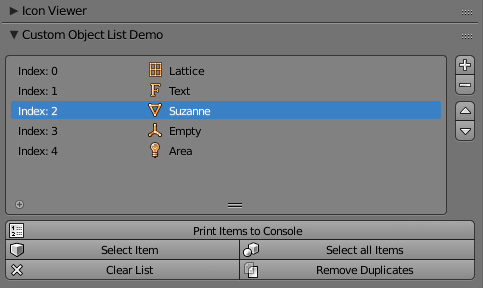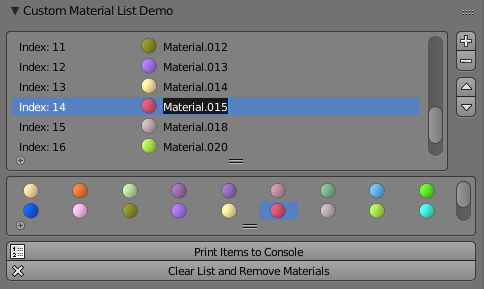The example given is called UIList. The following code is based on the Modifier UIList of this answer. Once registered, scene objects can be added, removed, printed or selected via UI Elements.
custom_uilist.py
import bpy
from bpy.props import (IntProperty,
BoolProperty,
StringProperty,
CollectionProperty)
from bpy.types import (Operator,
Panel,
PropertyGroup,
UIList)
# -------------------------------------------------------------------
# Operators
# -------------------------------------------------------------------
class CUSTOM_OT_actions(Operator):
"""Move items up and down, add and remove"""
bl_idname = "custom.list_action"
bl_label = "List Actions"
bl_description = "Move items up and down, add and remove"
bl_options = {'REGISTER'}
action = bpy.props.EnumProperty(
items=(
('UP', "Up", ""),
('DOWN', "Down", ""),
('REMOVE', "Remove", ""),
('ADD', "Add", "")))
def invoke(self, context, event):
scn = context.scene
idx = scn.custom_index
try:
item = scn.custom[idx]
except IndexError:
pass
else:
if self.action == 'DOWN' and idx < len(scn.custom) - 1:
item_next = scn.custom[idx+1].name
scn.custom.move(idx, idx+1)
scn.custom_index += 1
info = 'Item "%s" moved to position %d' % (item.name, scn.custom_index + 1)
self.report({'INFO'}, info)
elif self.action == 'UP' and idx >= 1:
item_prev = scn.custom[idx-1].name
scn.custom.move(idx, idx-1)
scn.custom_index -= 1
info = 'Item "%s" moved to position %d' % (item.name, scn.custom_index + 1)
self.report({'INFO'}, info)
elif self.action == 'REMOVE':
info = 'Item "%s" removed from list' % (scn.custom[idx].name)
scn.custom_index -= 1
scn.custom.remove(idx)
self.report({'INFO'}, info)
if self.action == 'ADD':
if context.object:
item = scn.custom.add()
item.name = context.object.name
item.obj_type = context.object.type
item.obj_id = len(scn.custom)
scn.custom_index = len(scn.custom)-1
info = '"%s" added to list' % (item.name)
self.report({'INFO'}, info)
else:
self.report({'INFO'}, "Nothing selected in the Viewport")
return {"FINISHED"}
class CUSTOM_OT_printItems(Operator):
"""Print all items and their properties to the console"""
bl_idname = "custom.print_items"
bl_label = "Print Items to Console"
bl_description = "Print all items and their properties to the console"
bl_options = {'REGISTER', 'UNDO'}
reverse_order = BoolProperty(
default=False,
name="Reverse Order")
@classmethod
def poll(cls, context):
return bool(context.scene.custom)
def execute(self, context):
scn = context.scene
if self.reverse_order:
for i in range(scn.custom_index, -1, -1):
item = scn.custom[i]
print ("Name:", item.name,"-",item.obj_type,item.obj_id)
else:
for item in scn.custom:
print ("Name:", item.name,"-",item.obj_type,item.obj_id)
return{'FINISHED'}
class CUSTOM_OT_clearList(Operator):
"""Clear all items of the list"""
bl_idname = "custom.clear_list"
bl_label = "Clear List"
bl_description = "Clear all items of the list"
bl_options = {'INTERNAL'}
@classmethod
def poll(cls, context):
return bool(context.scene.custom)
def invoke(self, context, event):
return context.window_manager.invoke_confirm(self, event)
def execute(self, context):
if bool(context.scene.custom):
context.scene.custom.clear()
self.report({'INFO'}, "All items removed")
else:
self.report({'INFO'}, "Nothing to remove")
return{'FINISHED'}
class CUSTOM_OT_removeDuplicates(Operator):
"""Remove all duplicates"""
bl_idname = "custom.remove_duplicates"
bl_label = "Remove Duplicates"
bl_description = "Remove all duplicates"
bl_options = {'INTERNAL'}
def find_duplicates(self, context):
"""find all duplicates by name"""
name_lookup = {}
for c, i in enumerate(context.scene.custom):
name_lookup.setdefault(i.name, []).append(c)
duplicates = set()
for name, indices in name_lookup.items():
for i in indices[1:]:
duplicates.add(i)
return sorted(list(duplicates))
@classmethod
def poll(cls, context):
return bool(context.scene.custom)
def execute(self, context):
scn = context.scene
removed_items = []
# Reverse the list before removing the items
for i in self.find_duplicates(context)[::-1]:
scn.custom.remove(i)
removed_items.append(i)
if removed_items:
scn.custom_index = len(scn.custom)-1
info = ', '.join(map(str, removed_items))
self.report({'INFO'}, "Removed indices: %s" % (info))
else:
self.report({'INFO'}, "No duplicates")
return{'FINISHED'}
def invoke(self, context, event):
return context.window_manager.invoke_confirm(self, event)
class CUSTOM_OT_selectItems(Operator):
"""Select Items in the Viewport"""
bl_idname = "custom.select_items"
bl_label = "Select Item(s) in Viewport"
bl_description = "Select Items in the Viewport"
bl_options = {'REGISTER', 'UNDO'}
select_all = BoolProperty(
default=False,
name="Select all Items of List",
options={'SKIP_SAVE'})
@classmethod
def poll(cls, context):
return bool(context.scene.custom)
def execute(self, context):
scn = context.scene
idx = scn.custom_index
try:
item = scn.custom[idx]
except IndexError:
self.report({'INFO'}, "Nothing selected in the list")
return{'CANCELLED'}
obj_error = False
bpy.ops.object.select_all(action='DESELECT')
if not self.select_all:
obj = scn.objects.get(scn.custom[idx].name, None)
if not obj:
obj_error = True
else:
obj.select = True
info = '"%s" selected in Viewport' % (obj.name)
else:
selected_items = []
unique_objs = set([i.name for i in scn.custom])
for i in unique_objs:
obj = scn.objects.get(i, None)
if obj:
obj.select = True
selected_items.append(obj.name)
if not selected_items:
obj_error = True
else:
missing_items = unique_objs.difference(selected_items)
if not missing_items:
info = '"%s" selected in Viewport' \
% (', '.join(map(str, selected_items)))
else:
info = 'Missing items: "%s"' \
% (', '.join(map(str, missing_items)))
if obj_error:
info = "Nothing to select, object removed from scene"
self.report({'INFO'}, info)
return{'FINISHED'}
# -------------------------------------------------------------------
# Drawing
# -------------------------------------------------------------------
class CUSTOM_UL_items(UIList):
def draw_item(self, context, layout, data, item, icon, active_data, active_propname, index):
split = layout.split(0.3)
split.label("Index: %d" % (index))
custom_icon = "OUTLINER_OB_%s" % item.obj_type
#split.prop(item, "name", text="", emboss=False, translate=False, icon=custom_icon)
split.label(item.name, icon=custom_icon) # avoids renaming the item by accident
def invoke(self, context, event):
pass
class CUSTOM_PT_objectList(Panel):
"""Adds a custom panel to the TEXT_EDITOR"""
bl_idname = 'TEXT_PT_my_panel'
bl_space_type = "TEXT_EDITOR"
bl_region_type = "UI"
bl_label = "Custom Object List Demo"
def draw(self, context):
layout = self.layout
scn = bpy.context.scene
rows = 2
row = layout.row()
row.template_list("CUSTOM_UL_items", "", scn, "custom", scn, "custom_index", rows=rows)
col = row.column(align=True)
col.operator("custom.list_action", icon='ZOOMIN', text="").action = 'ADD'
col.operator("custom.list_action", icon='ZOOMOUT', text="").action = 'REMOVE'
col.separator()
col.operator("custom.list_action", icon='TRIA_UP', text="").action = 'UP'
col.operator("custom.list_action", icon='TRIA_DOWN', text="").action = 'DOWN'
row = layout.row()
col = row.column(align=True)
row = col.row(align=True)
row.operator("custom.print_items", icon="LINENUMBERS_ON") #LINENUMBERS_OFF, ANIM
row = col.row(align=True)
row.operator("custom.select_items", icon="VIEW3D", text="Select Item")
row.operator("custom.select_items", icon="GROUP", text="Select all Items").select_all = True
row = col.row(align=True)
row.operator("custom.clear_list", icon="X")
row.operator("custom.remove_duplicates", icon="GHOST")
# -------------------------------------------------------------------
# Collection
# -------------------------------------------------------------------
class CUSTOM_objectCollection(PropertyGroup):
#name = StringProperty() -> Instantiated by default
obj_type = StringProperty()
obj_id = IntProperty()
# -------------------------------------------------------------------
# Register & Unregister
# -------------------------------------------------------------------
classes = (
CUSTOM_OT_actions,
CUSTOM_OT_printItems,
CUSTOM_OT_clearList,
CUSTOM_OT_removeDuplicates,
CUSTOM_OT_selectItems,
CUSTOM_UL_items,
CUSTOM_PT_objectList,
CUSTOM_objectCollection,
)
def register():
from bpy.utils import register_class
for cls in classes:
register_class(cls)
# Custom scene properties
bpy.types.Scene.custom = CollectionProperty(type=CUSTOM_objectCollection)
bpy.types.Scene.custom_index = IntProperty()
def unregister():
from bpy.utils import unregister_class
for cls in reversed(classes):
unregister_class(cls)
del bpy.types.Scene.custom
del bpy.types.Scene.custom_index
if __name__ == "__main__":
register()
Updated for Blender 2.8x: https://gist.github.com/p2or/d6dfd47366b2f14816f57d2067dcb6a9
As of 2.79 we can have real references to objects per ID by using a PointerProperty, which basically allows to display the actual data, access and edit the attributes on the fly.
Following funky example is a simple demo on how to create a custom UIList of materials. You can create new materials, display and edit their properties (name, color etc.) directly within the list.
material_uilist.py
import bpy
from bpy.props import (IntProperty,
BoolProperty,
StringProperty,
CollectionProperty,
PointerProperty)
from bpy.types import (Operator,
Panel,
PropertyGroup,
UIList)
def random_color():
from mathutils import Color
from random import random
return Color((random(), random(), random()))
# -------------------------------------------------------------------
# Operators
# -------------------------------------------------------------------
class CUSTOM_OT_actions(Operator):
"""Move items up and down, add and remove"""
bl_idname = "custom.list_action"
bl_label = "List Actions"
bl_description = "Move items up and down, add and remove"
bl_options = {'REGISTER'}
action = bpy.props.EnumProperty(
items=(
('UP', "Up", ""),
('DOWN', "Down", ""),
('REMOVE', "Remove", ""),
('ADD', "Add", "")))
def invoke(self, context, event):
scn = context.scene
idx = scn.custom_index
try:
item = scn.custom[idx]
except IndexError:
pass
else:
if self.action == 'DOWN' and idx < len(scn.custom) - 1:
item_next = scn.custom[idx+1].name
scn.custom.move(idx, idx+1)
scn.custom_index += 1
info = 'Item "%s" moved to position %d' % (item.name, scn.custom_index + 1)
self.report({'INFO'}, info)
elif self.action == 'UP' and idx >= 1:
item_prev = scn.custom[idx-1].name
scn.custom.move(idx, idx-1)
scn.custom_index -= 1
info = 'Item "%s" moved to position %d' % (item.name, scn.custom_index + 1)
self.report({'INFO'}, info)
elif self.action == 'REMOVE':
item = scn.custom[scn.custom_index]
item_name = item.material.name
mat = item.material
mat_obj = bpy.data.materials.get(mat.name, None)
if mat_obj:
bpy.data.materials.remove(mat_obj, True)
info = 'Item %s removed from scene' % (item_name)
scn.custom.remove(idx)
scn.custom_index -= 1
self.report({'INFO'}, info)
if self.action == 'ADD':
item = scn.custom.add()
item.id = len(scn.custom)
item.material = bpy.data.materials.new(name="Material")
item.name = item.material.name
item.material.diffuse_color = random_color()
scn.custom_index = (len(scn.custom)-1)
info = '%s added to list' % (item.name)
self.report({'INFO'}, info)
return {"FINISHED"}
class CUSTOM_OT_printItems(Operator):
"""Print all items and their properties to the console"""
bl_idname = "custom.print_items"
bl_label = "Print Items to Console"
bl_description = "Print all items and their properties to the console"
bl_options = {'REGISTER', 'UNDO'}
reverse_order = BoolProperty(
default=False,
name="Reverse Order")
@classmethod
def poll(cls, context):
return bool(context.scene.custom)
def execute(self, context):
scn = context.scene
if self.reverse_order:
for i in range(scn.custom_index, -1, -1):
mat = scn.custom[i].material
print ("Material:", mat,"-",mat.name, mat.diffuse_color)
else:
for item in scn.custom:
mat = item.material
print ("Material:", mat,"-",mat.name, mat.diffuse_color)
return{'FINISHED'}
class CUSTOM_OT_clearList(Operator):
"""Clear all items of the list and remove from scene"""
bl_idname = "custom.clear_list"
bl_label = "Clear List and Remove Materials"
bl_description = "Clear all items of the list and remove from scene"
bl_options = {'INTERNAL'}
@classmethod
def poll(cls, context):
return bool(context.scene.custom)
def invoke(self, context, event):
return context.window_manager.invoke_confirm(self, event)
def execute(self, context):
if bool(context.scene.custom):
# Remove materials from scene
for i in context.scene.custom:
name = i.material.name
mat_obj = bpy.data.materials.get(name, None)
if mat_obj:
bpy.data.materials.remove(mat_obj, True)
info = 'Item %s removed from scene' % (name)
# Clear the list
context.scene.custom.clear()
self.report({'INFO'}, "All materials removed from scene")
else:
self.report({'INFO'}, "Nothing to remove")
return{'FINISHED'}
# -------------------------------------------------------------------
# Drawing
# -------------------------------------------------------------------
class CUSTOM_UL_items(UIList):
def draw_item(self, context, layout, data, item, icon, active_data, active_propname, index):
mat = item.material
if self.layout_type in {'DEFAULT', 'COMPACT'}:
split = layout.split(0.3)
split.label("Index: %d" % (index))
# static method UILayout.icon returns the integer value of the icon ID
# "computed" for the given RNA object.
split.prop(mat, "name", text="", emboss=False, icon_value=layout.icon(mat))
elif self.layout_type in {'GRID'}:
layout.alignment = 'CENTER'
layout.label(text="", icon_value=layout.icon(mat))
def invoke(self, context, event):
pass
class CUSTOM_PT_objectList(Panel):
"""Adds a custom panel to the TEXT_EDITOR"""
bl_idname = 'TEXT_PT_my_panel'
bl_space_type = "TEXT_EDITOR"
bl_region_type = "UI"
bl_label = "Custom Material List Demo"
def draw(self, context):
layout = self.layout
scn = bpy.context.scene
rows = 2
row = layout.row()
row.template_list("CUSTOM_UL_items", "custom_def_list", scn, "custom",
scn, "custom_index", rows=rows)
col = row.column(align=True)
col.operator("custom.list_action", icon='ZOOMIN', text="").action = 'ADD'
col.operator("custom.list_action", icon='ZOOMOUT', text="").action = 'REMOVE'
col.separator()
col.operator("custom.list_action", icon='TRIA_UP', text="").action = 'UP'
col.operator("custom.list_action", icon='TRIA_DOWN', text="").action = 'DOWN'
row = layout.row()
row.template_list("CUSTOM_UL_items", "custom_grid_list", scn, "custom",
scn, "custom_index", rows=2, type='GRID')
row = layout.row()
col = row.column(align=True)
row = col.row(align=True)
row.operator("custom.print_items", icon="LINENUMBERS_ON")
row = col.row(align=True)
row.operator("custom.clear_list", icon="X")
# -------------------------------------------------------------------
# Collection
# -------------------------------------------------------------------
class CUSTOM_objectCollection(PropertyGroup):
#name = StringProperty() -> Instantiated by default
material = PointerProperty(
name="Material",
type=bpy.types.Material)
# -------------------------------------------------------------------
# Register & Unregister
# -------------------------------------------------------------------
classes = (
CUSTOM_OT_actions,
CUSTOM_OT_printItems,
CUSTOM_OT_clearList,
CUSTOM_UL_items,
CUSTOM_PT_objectList,
CUSTOM_objectCollection,
)
def register():
from bpy.utils import register_class
for cls in classes:
register_class(cls)
# Custom scene properties
bpy.types.Scene.custom = CollectionProperty(type=CUSTOM_objectCollection)
bpy.types.Scene.custom_index = IntProperty()
def unregister():
from bpy.utils import unregister_class
for cls in reversed(classes):
unregister_class(cls)
del bpy.types.Scene.custom
del bpy.types.Scene.custom_index
if __name__ == "__main__":
register()
Updated for Blender 2.8x: https://gist.github.com/p2or/30b8b30c89871b8ae5c97803107fd494
Same principle applies to all other types. Using the PointerProperty for e.g. objects in the scene, makes it pretty comfortable to edit, add and remove them safely without any additional checks.


